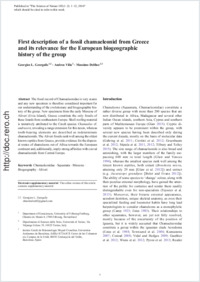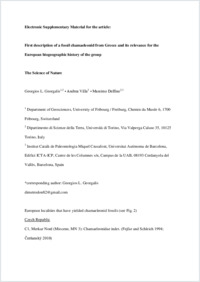First description of a fossil chamaeleonid from Greece and its relevance for the European biogeographic history of the group
- Georgalis, Georgios L. Department of Geosciences, University of Fribourg, Switzerland - Dipartimento di Scienze della Terra, Università di Torino, Italy
- Villa, Andrea Dipartimento di Scienze della Terra, Università di Torino, Italy
- Delfino, Massimo Dipartimento di Scienze della Terra, Università di Torino, Italy - Institut Català de Paleontologia Miquel Crusafont, Universitat Autònoma de Barcelona, Cerdanyola del Vallès, Barcelona, Spain
-
28.01.2016
Published in:
- The Science of Nature. - 2016, vol. 103, no. 1–2, p. 1–12
English
The fossil record of Chamaeleonidae is very scarce and any new specimen is therefore considered important for our understanding of the evolutionary and biogeographic history of the group. New specimens from the early Miocene of Aliveri (Evia Island), Greece constitute the only fossils of these lizards from southeastern Europe. Skull roofing material is tentatively attributed to the Czech species Chamaeleo cf. andrusovi, revealing a range extension for this taxon, whereas tooth-bearing elements are described as indeterminate chamaeleonids. The Aliveri fossils rank well among the oldest known reptiles from Greece, provide evidence for the dispersal routes of chameleons out of Africa towards the European continent and, additionally, imply strong affinities with coeval chamaeleonids from Central Europe.
- Faculty
- Faculté des sciences et de médecine
- Department
- Département de Géosciences
- Language
-
- English
- Classification
- Palaeontology
- License
- License undefined
- Identifiers
-
- RERO DOC 259441
- DOI 10.1007/s00114-016-1336-5
- Persistent URL
- https://folia.unifr.ch/unifr/documents/304955
Other files
Statistics
Document views: 46
File downloads:
- geo_fdf.pdf: 250
- geo_fdf_sm.pdf: 109

